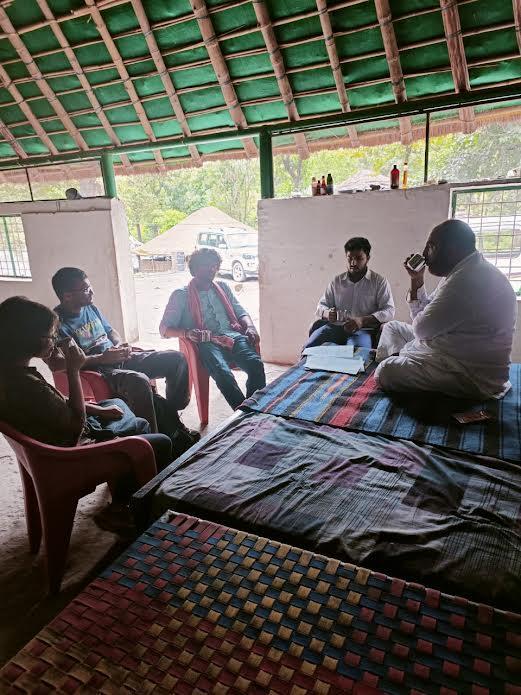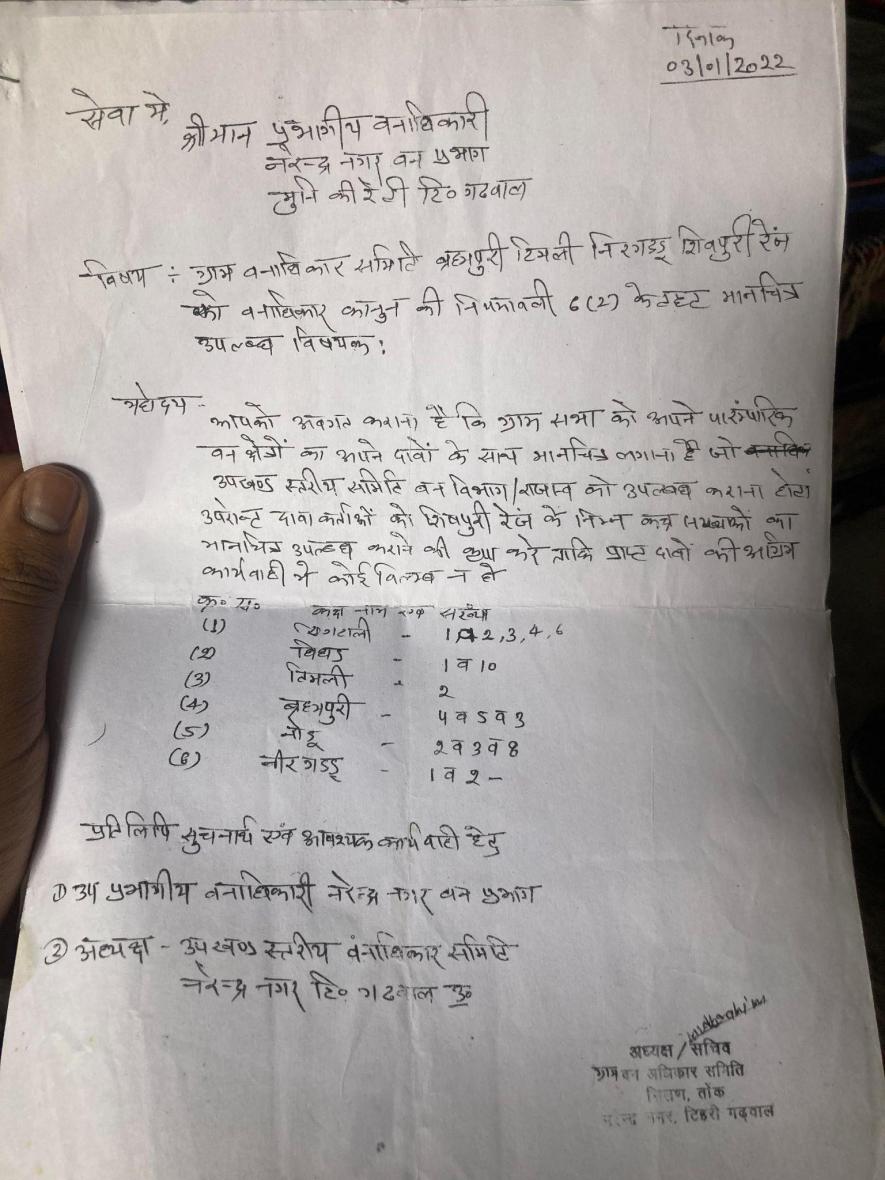Silan, a settlement of Van Gujjars in Tehri Garhwal, Uttarakhand
Eighty-six Families from Silan, a Van Gujjar settlement in Shivpuri Range, Tehri Garhwal, have filed their claims under the Scheduled Tribes and Other Traditional Forest Dwellers (Recognition of Forest Rights) Act, 2006 and further submitted them to the SDM office.
“We submitted these claims around 2-3 months back, with the hearing still being in the process. Ameer Hamza, president of Van Gujjar Tribal Yuva Sangathan (VGTYS), has been helping us with all these legal proceedings and formalities so far,” said Ibrahim, a resident of Silan who is also a member of the VGTYS. Despite all the efforts, forest dwellers of this region have not been granted legitimate land titles under FRA.
The Van Gujjars are among a few surviving transhumant pastoral communities worldwide. They are a rarity in that they are one of the few Muslim Tribals who have survived as nomads to the present day.
Originally from Jammu and Kashmir, the community has always asserted the prefix “Van” to reclaim their forest dweller identity as they are still not classified as forest-dwelling Schedule Tribes, unlike the hill states of Himachal Pradesh and J&K. The “Van” in their name also tends to assert their ancient symbiotic relationship they share with forests since time immemorial. This addition to the word Gujjar also distinguishes them from the mainstream community.
The primary occupation of the community is animal husbandry, which primarily comprises the Gojiri buffalo, an indigenous breed that cannot survive without seasonal migration and is identifiable by its unique horns and body structure. The Van Gujjars possess a unique culture owing to the spiritual beliefs they keep with respect to domestic livestock and wildlife.
Van Gujjar Tribal Yuva Sangathan was founded by young Van Gujjars striving to ascertain their collective struggles. There is a strong emphasis on reclaiming their tribal identity, as the state of Uttarakhand denies them their rightful Scheduled Tribe Status. The organisation was registered formally in 2020, but its members have been spearheading community development work since 2017.
Having faced systemic exclusion and exploitation due to the inadequate implementation of FRA by the Forest Department and concerning authorities, local youth from VGTYS rose to take on the work of empowering their community by educating themselves about the workings and provisions of the Forest Rights Act, 2006. The Forest Department, locally known as ‘Janglaat‘, is infamous amongst these forest dwellers for its apathy as, time and again, the Van Gujjars have been termed encroachers by the department, followed by eviction notices and drives.
Being marginalised to such an extent, the young Gujjars decided to fight back the state repression with constitutional means. Now, the members of VGTYS, with their aim of democratising information on the workings of administrative provisions on FRA, have been taking up this cause for the community all over Uttarakhand. So far, they have been instrumental in aiding people to file nomination claims, community rights claims, land rights claims, documentation and so on.
VGTYS has been highly instrumental in helping formulate Forest Rights Committees (FRC), a local body comprised of claimants, which is a prerequisite in the implementation process of FRA.
Gami, an elder from the community who has been spearheading this effort since 2002, speaks about the latest effort and the formation of a Forest Right Committee to finally address the long pending demand of the community.
“We still haven’t got land titles under FRA, and the committee is aimed to hasten the process of claims and represent all of us in courts,” Gami said.
Ibrahim says that the forest department, apart from threatening eviction, does not want the community of Van Gujjars to progress.
“How will a community thrive if they don’t have basic facilities to survive, such as schools, toilets, hospitals, Anganwadi in their locality, land to live on and construct houses and farm at?” he added. Not many land titles have been granted to the Van Gujjar.
“As granted by FRA 2006, Van Gujjars got land titles only in the district of Uttarkashi. They are some 23-24 families. Rest in the whole of Uttarakhand, we haven’t got any titles, and hence we need to fight for it,” Gami said.
The Dhebar commission set up by the Government of India in 1960 to scrutinise the implementation of provisions of special protection of Scheduled Tribes across the country, as granted by the Constitution, notes, “There is a feeling among the Tribals (Gujjars in this case) that all arguments in support of preservation and development of forests are intended to refuse from their demands. They argue that when it is a question of industry, township, development work or project of rehabilitation, all those plausible are forgotten, and vast tracts are placed at the disposal of outsiders who are mercilessly destroying the forest with or without necessity.”

(Gami (right), with Ibrahim (second from right), discussing the issues with the journalists)
“Earlier, due to a lack of awareness, we lagged in filing the FRA claims. Hence we couldn’t push to get land titles sooner,” Gami said. He formed the committee two years ago when the forest department served eviction notices to the residents of Silan. The committee then represented their defence in court, which is still in process. “The demand has been there since 2002, but now that they served us a notice, it became important for us to put forward our defence and demands,” Gami said.
The notice asking the Gujjars of Silan to vacate was sudden, and they wrote to the forest department, invoking the FRA, section 6(2), which grants the gram sabha the authority to delineate mapping of a claim to land in an area by a tribal community. Gujjars have asked for specific localities (called compartments) like Brahmapuri, Nirgaddu, etc., within the Shivpuri range. See the letter below.

(Letter by the Van Gujjar Committee presented to the forest department under FRA (2006), section 6(2))
As noted, Gujjars have never been granted rights to forest land before, except in Uttarkashi, where Ameer Hamza of the VGTYS has led the legal fight and claim to land rights.
“It took one year for them to get their due rights under FRA, and we, too, have been working on it for the past two years,” Gami said, hoping they can finally get land rights. While the line of narrative against the Gujjars of the authority, the forest department, has been that the forest-dwelling ways of Van Gujjars are detrimental to wildlife and threaten the ecosystem of national parks and forest ranges. Nothing is further from the truth, as Gujjars have lived in the forests for decades and are symbiotically related to the ecosystems.
The positive impact on the environment and the ecosystems of forests are umpteen. Their transhumant movement through the hills and forests across Uttarakhand nurtures the flora of many regions, while it is their way of life, practised holistically for decades. Their customs, festivals, anecdotes, folklore and tradition; all bear testimony to their symbiosis with forests they have thrived on for years. We could look at the community’s Sela Parv as the aptest example. Sela Parv is an annual festival celebrated by the community where saplings of local indigenous trees such as ‘Semal’ are planted and celebrated. The semal tree, like the other trees which find their mention in similar Gojri traditions, has high ecological and nutritional benefits.
From their traditional settlements (Deras) constructed of thatched roofs and mud walls to their local food, everything being organic seems to have a minimal carbon footprint. Yet, these rightful heirs are termed as encroachers in the very own forests they nurture.
The other symbiotic relationship they share with forests isn’t uncommon as well. For instance, as their economy depends on milk utilisation, they have an indigenous way of using the semal tree to skim milk. The branch of the tree is used to skim milk, which later grows into full-fledged trees. The transhumant path of Gujjars then organically helps the growth of such trees. The grazing of buffaloes also helps in the seed dispersal of many trees and plants. The cyclical system of grazing buffaloes, utilising forest produce, and giving back to the same forests through the aforementioned processes are rooted in the tribal way of life of the Gujjars.
Ibrahim adds that the relations of the Gujjars in the Shivpuri range and the whole of the Garhwal region of Uttarakhand with other communities, such as the rural Garhwali communities, is one of mutual support and care.
“As Gujjars have become aware and have started speaking out, more people from the villages interact with us. They are curious to know more about us and our unique pastoral lifestyle. We help them as well, for example, with our buffaloes. We get them to graze the fields and lands of people who want them cleared of vegetation. We help in many other ways, and they do the same,” he said.
As the people of Silan rear Gojri buffaloes like the rest of the community, all the families depend on the buffaloes’ milk. Their livelihood depends on selling milk from the buffaloes and, in turn, on the forests for grazing. While the other communities, although rural, depend on forest produce as well. The Garhwali Hindu community, too, rears cattle and needs fodder for them. As they both depend on forest use, that’s why, Ibrahim says, communities co-exist with Van Gujjars with mutuality.
While the forest department’s threat to the residence of Gujjars in the forests is a major concern, an anxiety that the Gujjars have to fight against consistently, projects such as those related to National Highway and Railways too affect their lives. Ibrahim says that the authorities uprooted a nearby van Gujjar locality, Bhingani, without any prior notice. Gami used to live in that locality previously before shifting to Silan. It was uprooted to give way to a development project of the Railways. “We lose land and forest access due to random predicaments,” Ibrahim says.
Inadequate electricity supply, lack of access to water, and improper roads are a few of many problems which ail the region. Hence, it is important that the Gujjars win rights over land to settle, in addition to being provided with the aforementioned facilities that have been lacking.
Silan, interestingly, has been a settled area for the past 12 years. Gami says that due to the transhumant nature of their lives, children’s education and awareness within the community were lacking. This is due to migrations every six months.
“Families migrate to higher ground, after staying at one place for six months, to graze buffaloes elsewhere. This affects the schooling of our children,” Gami said. The elders of the locality settled in the area of Silan so that children could go to school regularly. Ibrahim is one such youth who has gone to regular school and now is a bachelor’s student of Sociology, all the while helping the community.
“There is a government school 1 kilometre away from here. All our children go there to study,” Ibrahim said. Hence it becomes even more pertinent for the families to get the rights to the land in the Shivpuri range, says Mohammed Wazir, another resident of Silan. “Our milk business isn’t profitable at all. All we get is low rates and no support from the government to incentivise our trade,” says Wazir, as most profit is also earned by milk supplier middlemen, known as Lalas. Reshma, another resident, adds that she would like her children to get jobs in the city and progress, as “the dangar (cattle) are not useful to sustain our families. We want our children to get the education and work to live a better life,” she says.
The writers are independent journalists. All views are personal.
Courtesy: Newsclick
